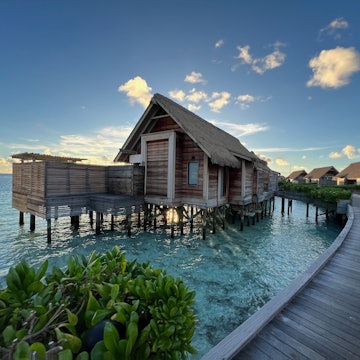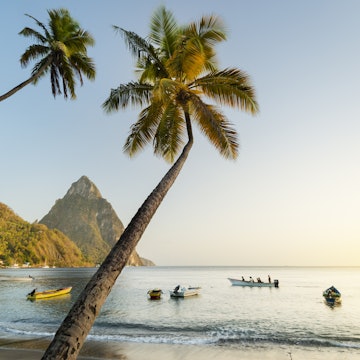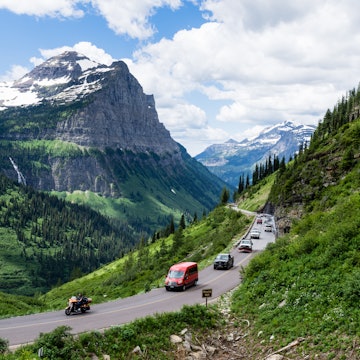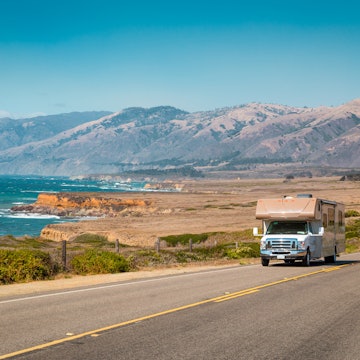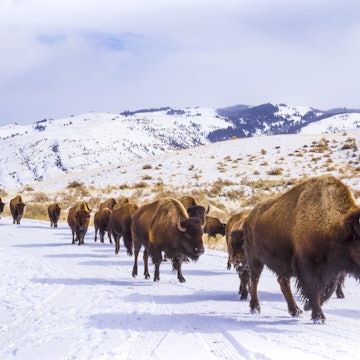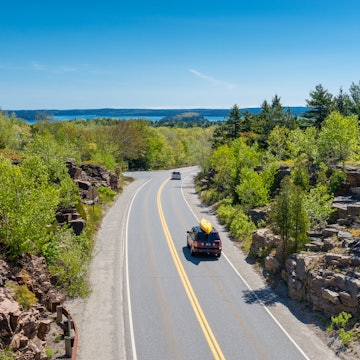

Getting that big sky feeling at Cracker Lake, Glacier National Park © Jacob Frank / NPS
With so much wilderness right on the doorstep, there's always something to do in Montana at any time of year. The state is highly in tune with the rhythms of nature, and activities vary with the weather and season.
The peak summer and winter seasons always draw in a crowd, but the shoulder seasons in late spring and fall reveal a calmer, quieter side to the Big Sky state. Whenever you come, check if you can do the activities you want to do and see the places you want to see at that time of year.
Summer is the high season, thanks to the endless opportunities for hiking and outdoor exploration, but snow sports in winter are another major draw thanks to the state's consistent covering of fluffy snow. It's important to note that businesses often use the less popular shoulder season and off-season to perform renovations or reduce their hours. Even so, the quieter months are ideal if you want to see Montana looking more like it did in the frontier days, without queues of RVs on the highways.
Here's a guide to what Montana has to offer throughout the year, from hiking-friendly summer to ski-tastic winter and everything in between.

The summer high season (July–August) is the time for hiking and water activities
Montana is extremely family-friendly and it's easy to drive deep into wild country when there's no snow, making summer the peak season to visit the state. Yellowstone National Park is in full swing by this point, and the Going To The Sun Road in Glacier National Park is clear of snow and open to traffic by the end of June or early July. As the snow melts, seasonal workers flock to staff mountain resorts and support the surge in tourism, and the state's bears come out of hibernation.
This is the ideal time to engage in the summer activities for which Montana is famous. Fly-fishing, hiking, cycling, whitewater rafting, wildlife spotting, admiring the wildflowers and going to the rodeo are just some of the ways to keep busy in Montana summer. This is also when the huckleberries come out, if you're willing to fight the bears for them (carry bear spray to be on the safe side).
The festival calendar is busy, too. Big events in July include the Under the Big Sky Festival in Whitefish and Flathead Cherry Festival in Polson; in August, try the Sweet Pea Festival in Bozeman and Huckleberry Festival in Trout Creek.
The cons of visiting Montana during the high season are higher prices and crowds, which can somewhat defeat the purpose of exploring these wide-open spaces. Another inconvenience is the heat, which often surprises visitors who assume this snow-prone state is always cold. Temperatures can climb above 100ºF during the day in the high season, and with regular wildfires, the air is often hazy, obscuring the mountain vistas that many have traveled so far to gaze upon.

The winter high season (December–March) is the best time for snow sports
Winter is another extremely popular time to visit Montana, and the focus is still on outdoor activities – just a different set. There are ski and snowboarding resorts throughout the state, the most popular of which is Big Sky, about an hour from Bozeman. Snowmobilers also descend on Montana en masse in the winter, congregating in Cook City, just north of Yellowstone National Park.
Winter is actually an exceptional time to visit Yellowstone, even though only the northern road is open. You won't be able to see Old Faithful or many other famous sights within the park, but wolves and other wildlife (besides the hibernating species) gather in the Lamar Valley, and are easy to spot against the white snow. Tour operator Yellowstone Wolf Tracker's winter tours are nothing short of epic for wildlife spotters. Other popular winter activities in Montana include snowshoeing, dog sledding and cozying up by the fire in a log cabin while snowflakes fall outside the window.
Winter is not always an easy time to visit, though it can be very rewarding. The roads can be tricky to navigate if you are not an experienced winter driver, and many non-tourist businesses close their doors until summer comes again. Sunshine is limited at this time of year, and temperatures can drop past the point of being deadly if you're not prepared; keep emergency food, water and blankets in your vehicle.
On the plus side, you may spot the aurora borealis lighting up the sky on dark nights, and many towns serve up winter cheer in the form of fun-filled winter carnivals, such as Lewistown's Montana Winter Fair, the Bozeman Ice Festival and the Winter Carnivals in Red Lodge and Whitefish.

The shoulder season (September–November) is the best time for avoiding the crowds
The shoulder season is locals' favorite time of year. After all, people don't live in Montana for the noise and bustle. The weather is mild, the roads and trails are still open, and the crowds have mostly gone home after the summer crush. If you're looking to see Montana in its most pristine state, this is the time to come. Plus, October is when the leaves start to change color, with a vivid shift towards crimson, orange and yellow to rival any fall colors you'll find in New England.
There are some inconveniences, though. Many restaurants, hotels, and other businesses shed staff when the schools start back up again, and some use the lull between summer and winter to do renovations. Service can be slower than normal and activities harder to come by, but Montana culture is nothing if not encouraging of a little self-reliance. It's also worth noting that Montana's unpredictable weather can mean rain in September, obscuring the views.
There are some good festivals, like Missoula Oktoberfest, and the Wine and Food Festival and HarvestFest in Billings.

Low season (April–June) is the best time for budget travelers
What other places refer to as the low season, Montanans call the mud season. This is the time of year when winter turns to spring and the snow melts, leaving lakes of mud in its wake. It's not all bad, though – this is playtime for off-roaders and 4WD enthusiasts, as well as car washing businesses. Restaurants and tour operators use the slow season to get ready for summer, and many popular outdoor areas stage a soft opening without the overwhelming summer crowds.
As you might expect, this is a rainy time of year, which can create hazardous road conditions and disappointing vistas. On the flip side, hotels will be at their least expensive prices during this slow season for customers. Pond skimming, art walks, farmer's markets and the International Wildlife Film Festival in Missoula are popular events. It's also worth making time for the Lewis and Clark Festival in Great Falls and Montana Mule Days in Hamilton.










